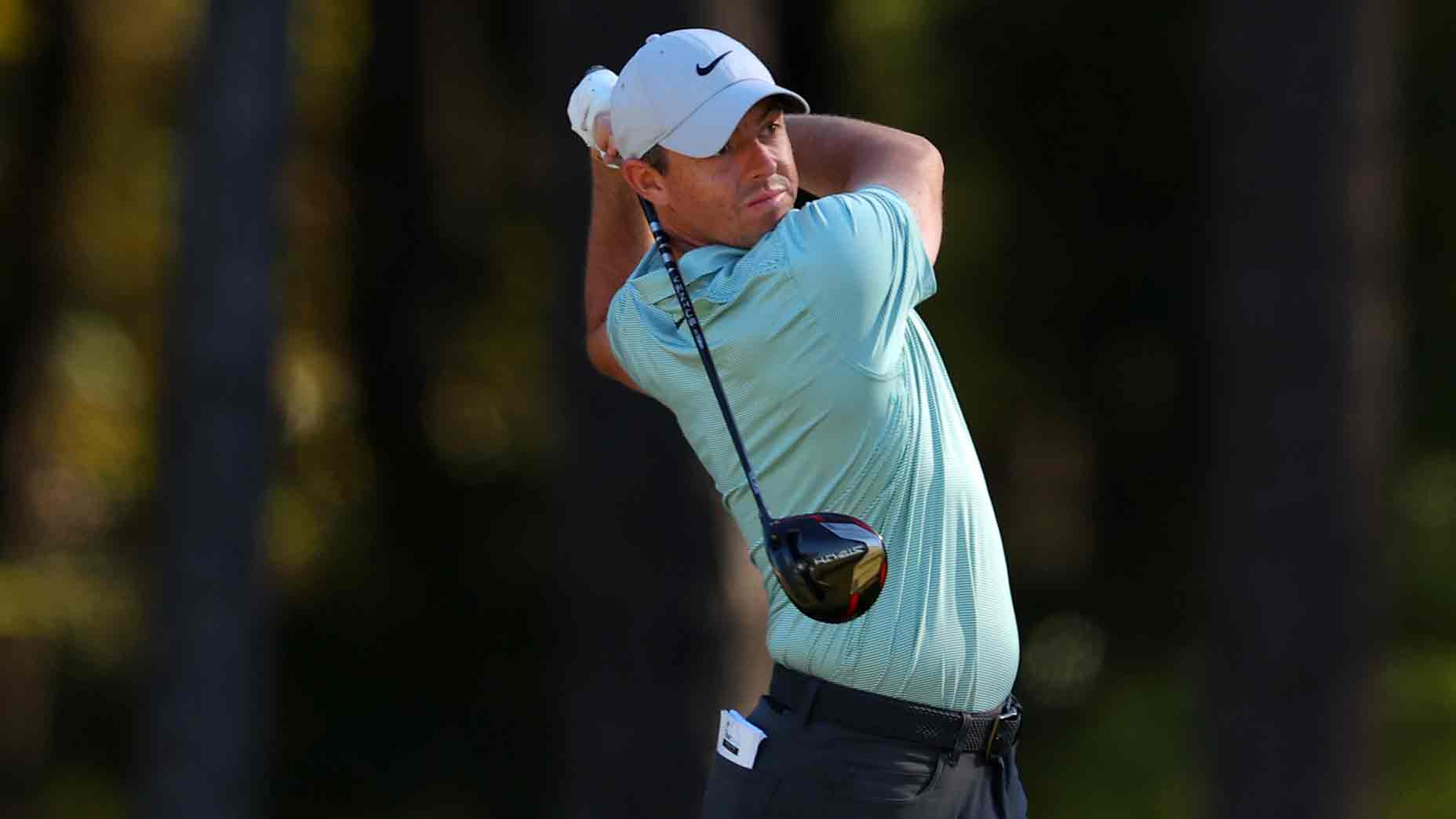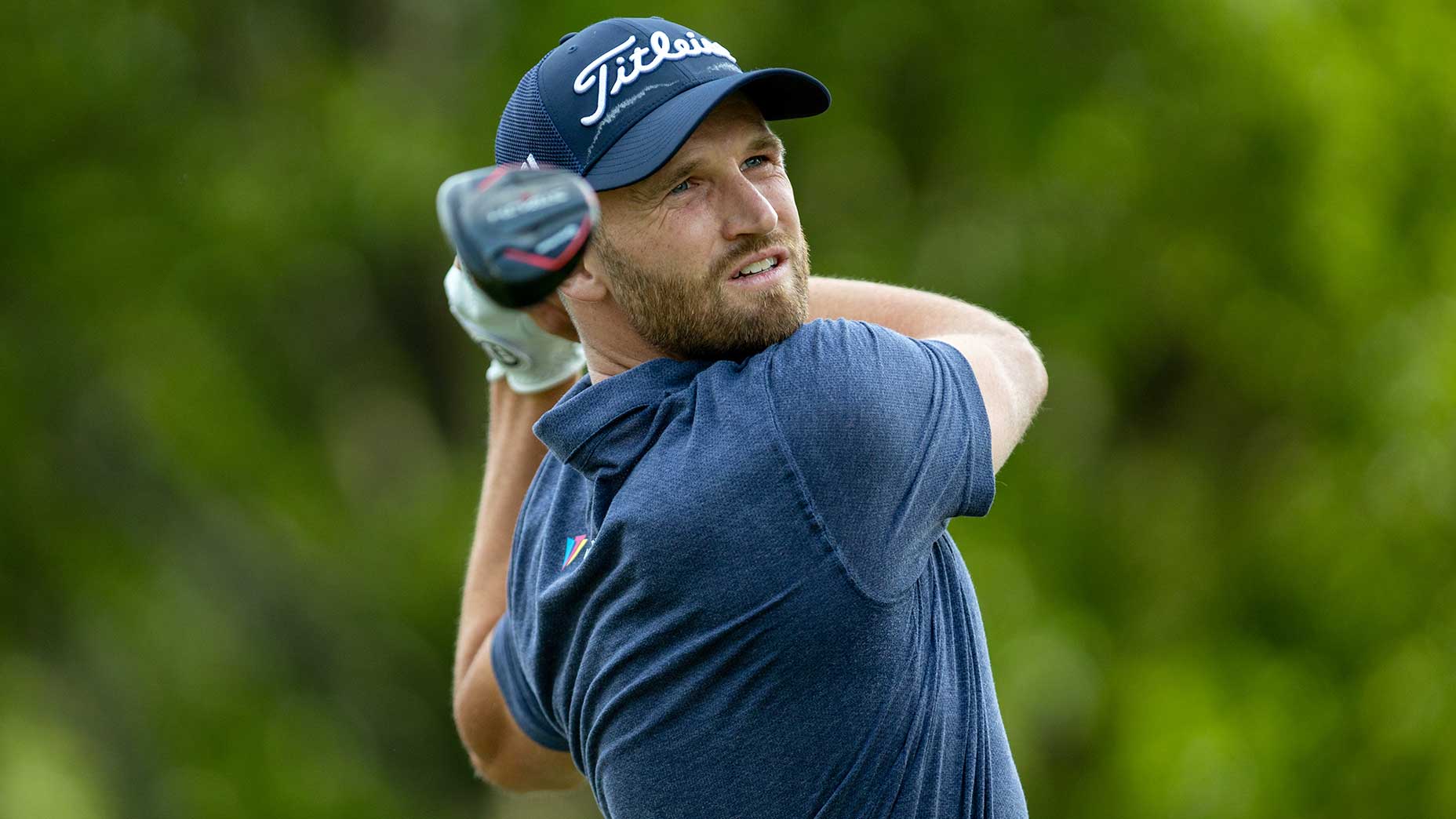LOS ANGELES — Before the final round of the 123rd U.S. Open, mental coach Julie Elion told her pupil Wyndham Clark, who had never won on the PGA Tour in five seasons until May and had never finished better than T-75 in a major, that he could stare down Rory McIlroy, playing in the group ahead of him, and Rickie Fowler, another of the most popular players in the game.
“She goes, every time you hear someone chant ‘Rickie,’ think of your goals and get cocky and go show them who you are,” Clark said. “I did that. It was like 100 plus times today I reminded myself of the goals. Now maybe they’ll be chanting my name in the future.”
Now maybe they will after the 29-year-old Clark closed in even-par 70 at Los Angeles Country Club to win his first major championship of his career, finishing with two gutsy pars to edge McIlroy by one stroke.
It’s all the more remarkable when you consider that Clark nearly quit golf after his mother, Lise, died of breast cancer. She had started him in the game, driven him to his tournaments and she was his rock, instilling in him the mantra of “Play big.”
“Even in junior golf there’s times when you’re so mad and you feel like you should have done better or you’re embarrassed with how you played, or other sports, she was always there to comfort me,” Clark said.
Without his mother, who died when he was 19, Clark was lost.
“When I was on the golf course I couldn’t have been angrier. I was breaking clubs when I didn’t even hit that bad of a shot. I was walking off golf courses,” Clark recalled. On multiple occasions at Oklahoma State, he stormed off the course and emptied his locker as if he was going to quit only for his then-coach Mike McGraw to pick up his gear and put it back. But eventually, McGraw decided to stage his own version of an intervention.
U.S. OPEN: Leaderboard | Photos
“He said, ‘Hey, I think it’s just best if you step away from golf. At first I really was mad. I’m competitive. I didn’t want to not play, and I thought it was bad if you redshirted, that you weren’t good enough,” Clark recalled. But it was also the best thing for me. I owe Mike a lot for that.”
When Clark returned to the team under new coach Allan Bratton, he remained intense, and when he didn’t make the squad for the 2016 NCAA tournament, he decided to transfer to Oregon. At the same time, John Ellis returned there to his alma mater to serve as an assistant coach to Casey Martin, who told him, “You’re going to be watching over this guy a lot.”
“I heard of this talented kid but there are a lot of those in the college ranks,” Ellis recalled. “What stood out was that he wanted to be the best in the world and he was willing to work harder than everybody.”
Clark blossomed into the Pac-12 Player of the Year and when he turned pro Ellis joined him as his caddie. Clark managed to keep his PGA Tour card but he couldn’t nab that first win.
Three. Shot. Lead. @Wyndham_Clark widens his lead after a stellar second shot into No. 14 leads to birdie #USOpen pic.twitter.com/eoEPd6yzsh
— U.S. Open (USGA) (@usopengolf) June 19, 2023
“I was beginning to think that maybe I’ll never win,” he said. “I know that sounds crazy because I’ve only been out here five years, but I had a lot of chances to where I was within two or three shots either going into the back nine or starting on a Sunday and I always seem to fall short, and not only that, but seem like I fell back in positions.”
There were times when Clark was so frustrated with his play that he was ready to quit. Indeed, he withdrew from the Rocket Mortgage Classic in 2020, citing a back injury but he could’ve just as easily cited attitude. As he continued to run hot, Ellis, his agent and the rest of Clark’s team orchestrated an intervention in November and suggested he meet with Elion, who has helped the likes of Phil Mickelson and Jimmy Walker win majors.
“I was a little reluctant to do it, and I’m just so glad that she was brought into my life, and what these honestly six months, it’s crazy to see how much I’ve improved and how much she’s helped me,” he said. “I wouldn’t have thought I’d be a major champion six, seven months ago.”
Elion is pretty tight-lipped about how she helps players, but noted that Clark has outworked any of her other students and said, “I just held up the mirror.”
Clark has finally learned to harness his emotions. Since a young age, Clark has been called a winner. That’s what his mom used to call him. And he finally validated all his other-worldly talents last month by winning the Wells Fargo Championship.
“The weight of expectation has been lifted,” Martin said, “Like, ‘Oh, I’ve justified my talent. I’ve I’m not a failure,’ you know, kind of a deal.”
Clark opened with a 64 on a day of record scoring in which Fowler and Xander Schauffele shot the first two 62s in U.S. Open history.
“I’m used to the U.S. Open being as mean as a pitbull with a bad tooth,” said Golf Channel’s Brandel Chamblee. “This was more like a basket of kittens.”
The marine layer burned off on Friday and LACC began to play fast and firm and showed some of its fangs, but Clark handled it all in stride, posting rounds of 67-69 and making a birdie at the final hole in near-darkness on Saturday to share the 54-hole lead with Fowler and secure his spot in Sunday’s final group.
He made birdie on the first hole to take the lead and never relinquished it despite some dicey moments, including saving bogey at No. 8 after whiffing on a pitch shot, and rescuing pars on Nos. 9 and 11 with a nifty short game. He handled this potential mine fields beautifully. If there ever was a moment that personified his mom’s message to “Play big,” it was at the par-5 14th, where he busted a 3-wood from 271 yards to set up a two-putt birdie and grab a three-stroke lead.
But winning the U.S. Open required handling one more dose of adversity. After being the only player in the 65-man field on Sunday to bogey the short par-3 15th and another bogey at 16, he made two clutch pars and clenched his fists and hugged Ellis after finishing at 10-under 270.
“I felt at ease,” he said. “I kept telling myself ‘I can do it, I can do it.’ ”
That sense of calm? Clark had a pretty good idea where it stemmed from, as did Fowler, who said as much when they shared a quiet moment together.
“I went back in there and just said, your mom was with you,” Fowler said. “She’d be very proud.”
“I just felt like my mom was watching over me today,” Clark said during his trophy presentation. “She can’t be here, and I miss you, mom.”
One person who never stopped believing in Clark was Ellis. On Saturday night, he had flipped on Golf Channel and all he heard was talk about McIlroy, Fowler and world No. 1 Scottie Scheffler, who was in striking distance too.
“No one was giving us a chance,” he said. “I made it a point to let him know and we were here to get it done too.”
And while Clark spoiled the Hollywood ending of Fowler finally winning a major or McIlroy ending his nearly nine-year major-less drought, Ellis knew that Clark was meant to be more than a bit character in the finale of the 123rd U.S. Open.
“He does things that other guys can’t do. He hits it a mile, he putts and chips with some of the best. You put that together and get your mind right, he’s going to be hard to beat,” Ellis said.
What a beautiful mind, indeed.








